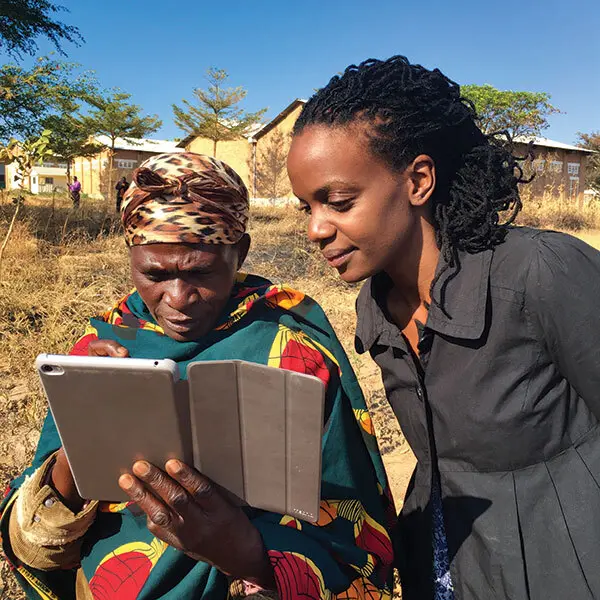Meet Dr. Catherine Nakalembe, a Ugandan NASA scientist whose work in remote sensing is providing innovative solutions to food security through satellite technology. As an Associate Research Professor at the University of Maryland’s Department of Geographical Sciences, she specializes in using satellite data for agricultural monitoring. Dr. Nakalembe also leads NASA’s Harvest Africa program, coordinating projects across the continent.
Growing up in an athletic family, Dr. Nakalembe initially wanted to pursue sports science. “I play a lot of badminton, tennis, volleyball, netball, and basketball, so I had hoped to study sports science at university as an undergraduate,” she recalls. However, her plans changed when she was offered a government scholarship to study Environmental Science instead.
This decision led her to where she is today—a career dedicated to understanding and applying satellite data to address critical environmental and agricultural challenges.
As a research professor, Dr. Nakalembe spends much of her time conducting field research and working on applied science projects. “I use satellite data primarily to extract information, which is then applied in various ways, especially for agricultural monitoring,” she explains.
As the Africa program lead for NASA’s Harvest initiative, she has played a key role in coordinating projects across the continent. Since beginning her work in East Africa in 2013, she has focused on capacity building, training individuals, and collaborating with African universities to integrate satellite observations into decision-making processes.
“I was inspired by the fact that, despite significant advancements in space technology and remote sensing, much of this technology is not integrated or used directly in decision-making processes,” Dr. Nakalembe says. Her Ph.D. research focused on drought monitoring in northeastern Uganda, examining how land use and land cover intersect and influence policy.
Dr. Nakalembe’s use of satellite technology has significantly impacted communities by providing early warnings for environmental events such as storms and floods. By analyzing satellite data, she can predict outcomes at the end of growing seasons, which is crucial for timely intervention and support. This information not only helps communities directly but also informs government policies aimed at mitigating the effects of drought and other environmental challenges.

One of her notable projects, the STARS (Spurring Transformation of Agriculture through Remote Sensing) initiative, involved collaborating with Tanzania’s Ministry of Agriculture to integrate satellite data into food security monitoring. Supported by the Gates Foundation, this work laid the groundwork for her ongoing contributions to the field.
Currently, Dr. Nakalembe leads various projects that employ machine learning and satellite data to map and monitor agriculture in five African countries that include Uganda, Kenya, Tanzania, Rwanda, and Mali. She is also involved in the GEOGLAM (Group on Earth Observations Global Agricultural Monitoring) initiative, which promotes the use of satellite data for agricultural monitoring on an international scale.
Dr. Nakalembe explains that much of the data is collected using phones, drones, and GoPro cameras installed on cars and helmets. “We gather images, train a machine learning model to detect the crops we are interested in, calculate the distance from the road to the crop field, and extract the crop type label, which is then used to train satellite data models.”
In recognition of her contributions, Dr. Nakalembe has received several awards, including the Group on Earth Observations (GEO) Individual Excellence Award in 2019 and Africa’s Food Prize in 2020. In 2022, she was awarded the prestigious 2022 Al Sumait Prize for African Development
Her work in disaster risk financing has supported over 90,000 households in Uganda’s Karamoja region and saved the government over 11 million dollars.
Reflecting on her journey, Dr. Nakalembe notes that her path to becoming a researcher wasn’t straightforward, which made it take longer to find her direction. “As a problem solver, a trait I inherited from my dad, I’ve always found ways to navigate obstacles,” she says. However, the most challenging time came when she became a mother, particularly after discovering she was pregnant with twins. “It was overwhelming and life-changing, but it also fueled my determination to persist in my work. I wanted to be a strong, hardworking role model for my children, just as my mother was for me. So balancing motherhood, a full-time research career, and personal time has been incredibly difficult, and it’s something I am still trying to figure out.”
Looking ahead, Dr. Nakalembe aims to create more opportunities for African researchers by helping them access funding and guidance. She also envisions merging her scientific work with her sister’s badminton camp located in Uganda, linking sports and science for young girls.
“What drives me is knowing that the work I do can have a meaningful impact on someone’s life and meeting people full of potential and helping them take that next step. This adds meaning to my work.”
Her advice to aspiring female scientists is to persevere despite challenges. “The doors will eventually open. If you prepare for an opportunity and you’re ready, that opportunity is yours. But if you’re not ready when it comes, you can’t go back and prepare, it will be gone. So work hard at whatever task you do. Someone will recognize your talent and gift, and if you truly love what you do, you will find a way to succeed.”

